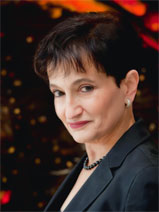
Naomi Goldenberg is professor of Classics and Religious Studies at the University of Ottawa. Her specialisms include Psychoanalysis, Women and Religion, and Cultural Studies. Her publications include Resurrecting the Body (Crossroad Publishing, 1993),The End of God (University of Ottawa Press, 1981), and Changing the Gods (Beacon Press, 1979).
It's a COVID-style international spectacular for the ninth(!) annual RSP mid-season special. It's time to play... the Weakest Link! Join Andie Alexander, Jonathon O'Donnel, Titus Hjelm, Naomi Goldenberg, Sidney Castillo, Russell McCutcheon, Ray Radford, and Megan Goodwin as David Robertson fires questions at them and Chris Cotter remotely operates PowerPoint! Who will win the coveted fictional research funding?
David Robertson talks to Naomi Goldenberg in this episode of Are You My Data? recorded at Leibniz University in Hannover.
Naomi Goldenberg argues that 'religion', as a separate sphere from governance, has been projected onto the past for strategic purposes. How does viewing religions as "restive once-and-future governments" help us understand the functioning of this category in contemporary discourse?
Does the public benefit from the social-scientific study of religion? Should it? How do we demonstrate benefit, measure it, communicate it? What are the practical and theoretical issues surrounding the idea of how the study of religion can operate in the, or perhaps as a, public good? For that matter, what do we mean by ‘public’ or ‘benefit’?
In this episode, Jonathan Tuckett is joined by Naomi R. Goldenberg, who argues that religions are formed in distinction to governmental ‘States’ and represent the last vestiges of the previous order and explores several examples of this as well as considering the implications of this distinction.
This work is licensed under a Creative Commons Attribution- NonCommercial- NoDerivs 3.0 Unported License.
The views expressed in podcasts, features and responses are the views of the individual contributors, and do not necessarily reflect the views of The Religious Studies Project or our sponsors. The Religious Studies Project is produced by the Religious Studies Project Association (SCIO), a Scottish Charitable Incorporated Organisation (charity number SC047750).